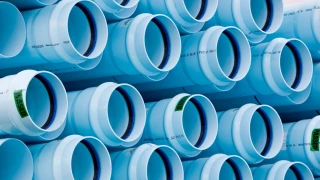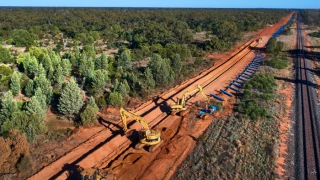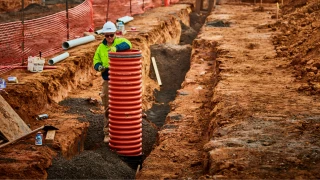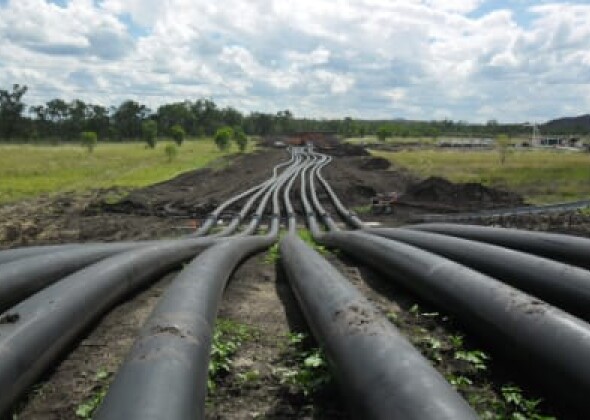Poliplex PE100 Pipe
Polyethylene (PE) pipes offer exceptional performance for both above and below ground applications. PE Pipes have a complete range of available fittings and very long asset life. PE pipes have been produced in Australia since the mid 1950’s, whilst initially in smaller diameters for industrial and agricultural applications, PE pipe and fittings are now available in diameters up to 2000mm. Usage of PE pipes across a broad range of industries and applications has grown rapidly since this period and polyethylene resins are evolving from the traditional PE100. The growing demand for higher performance and longer-life PE pipes has driven us to develop a PE pipe system that will provide reliable service for 100 years or more.
Get a great quote on our range of PE pipes and fittings by contacting us below.
Applications
Applications
POLIplex® high pressure polyethylene pipes are used to convey all types of liquids and gases for above and below ground applications including:
- Urban water and gas supply
- Mine dewatering
- Irrigation supply
- Slurry pipelines
- Vacuum, pressure and gravity sewer systems
- Submarine pipelines and ocean outfalls
- Trenchless pipeline installation and rehabilitation
- Industrial process pipe work
- Compressed air services
- Electrical and telecommunication cable conduits
- Upstream coal seam gas and water pipelines
Iplex POLIplex® PE Pipes and Fittings System - Product Catalogue and Technical Guide
Advantages
POLlplex® polyethylene pipes offer industry leading benefits, making them highly effective in industrial, agricultural and civil applications. Benefits of PE100 pipes include:
- Long length pipes available
- Full axial restraint which eliminates the need for thrust blocks
- Low celerity material minimises water hammer
- UV stability for above ground pipelines
- Rust and corrosion free
- Long length pipes available to minimise amount of joints
- Complete range of fittings
- Weldable using butt and electrofusion methods
- High ring stiffness for deeply buried pipelines
- Excellent abrasion resistance
- Possibility of 100+ year asset life
Material Options
Material Options
Mechanical Properties
| Property | Value & Unit |
| Density (Specific Gravity) | 955kg/m3 |
| Yield Strain | 10% |
| Yield Stress | 25MPa |
| Compressive Strength | 32MPa |
| Tensile Modulus | 900MPa |
| Hardness Shore D | 63 |
| Poisson’s Ratio | 0.4 |
| Ring bending modulus (3 mins) | 950MPa |
| Ring bending modulus (50 yrs) | 260MPa |
Thermal Properties
| Property | Value & Unit |
| Coefficient of Thermal Expansion | 1.8 x 10-4/°C |
| Thermal Conductivity | 0.38W/m.K |
Typical Fire Resistance Properties
| Property | Value & Unit |
| Ignitability | 13 |
| Smoke Development | 3 |
| Spread of Flame | 7 |
| Heat Evolved | 6 |
Temperature Effect On Pressure Rating
The co-efficient thermal linear expansion of polyethylene varies with temperatures, but at ambient temperature lies in the range 1.2 to 2.4 x 10-4 per degree C. In broad terms, this is about twenty times that of steel and therefore unrestrained pipe will expand or contract much more than the steel structure that may be supporting it.
Should the pipe be fully restrained, the strain due to thermal changes will generate stress in the material. However due to the relatively low tensile deformation modulus of polyethene and assuming a typical ambient temperature fluctuation of less than 40°C, it can be assumed that the safe allowable stress will not be exceeded. Over the longer term, stress relaxation will increase the ability of polyethylene to accommodate high thermal strains.
The conductivity of polyethylene varies with temperature almost linearly and is typically O.47W/m.K at 0°C to 0.37W/m.K at 70°C.
The specific heat of polyethylene varies with temperature from 1800 Joules/kg.K at 0°C to 2200J/kg.K at 60°C.
All temperatures above 25°C - it is necessary to re-rate polyethylene pressure pipe systems. The table below provides guidance as to the maximum operating pressure of PE100 pipes at temperature. It should be noted that at constant temperatures greater than 40°C, the 50-year design life of POLlplex® pipes may be reduced.
Thermal Re-rating of PE100 polyethylene POLIplex® pipe
Maximum allowable operating pressure - PE100 Water pipe (m head)
| Temp°C | PN4 | PN6.3 | PN8 | PN10 | PN12.5 | PN16 | PN20 | PN25 |
| 20 | 40 | 63 | 80 | 100 | 125 | 160 | 200 | 250 |
| 25 | 36 | 58 | 73 | 91 | 115 | 145 | 182 | 227 |
| 30 | 36 | 58 | 73 | 91 | 115 | 145 | 182 | 227 |
| 35 | 33 | 53 | 67 | 83 | 106 | 133 | 167 | 208 |
| 40 | 33 | 53 | 67 | 83 | 106 | 133 | 167 | 208 |
| 45 (35 y)* | 31 | 49 | 62 | 77 | 99 | 123 | 154 | 192 |
| 50 (22 y)* | 29 | 46 | 57 | 71 | 91 | 114 | 143 | 179 |
| 55 (15 y)* | 29 | 46 | 57 | 71 | 91 | 114 | 143 | 179 |
| 60 (7 y)* | 27 | 43 | 53 | 67 | 85 | 107 | 133 | 167 |
| 80 (1 y)* | 20 | 32 | 40 | 50 | 63 | 80 | 100 | 125 |
i. The values tabled are for POLlplex® pipe manufactured to AS/NZS 4130 and fittings made from compounds complying with AS/NZS 4131.
ii. The times given in years as (35y) are allowable extrapolation limits obtained by applying the factors in Table 1 of ISO 9080 to two years of test data at 80°C. Where appropriate specific advice should be obtained from the manufacturer and data provided shall be derived from testing to ISO 9080.
Visco Elasticity
Tensile Strength and Modulus
Long-term Bursting Strength
Thermal Expansion and Contraction
The co-efficient thermal linear expansion of polyethylene varies with temperatures, but at ambient temperature lies in the range 1.2 to 2.4 x 10-4 per degree C. In broad terms, this is about twenty times that of steel and therefore unrestrained pipe will expand or contract much more than the steel structure that may be supporting it.
Should the pipe be fully restrained, the strain due to thermal changes will generate stress in the material. However due to the relatively low tensile deformation modulus of polyethene and assuming a typical ambient temperature fluctuation of less than 40°C, it can be assumed that the safe allowable stress will not be exceeded. Over the longer term, stress relaxation will increase the ability of polyethylene to accommodate high thermal strains.
Flammability
On the application of heat, polyethylene melts at between 120°C and 135°C and will catch fire at 340°C in the presence of name. Combustion is not self supporting if there is less than 17% oxygen present.
Under the appropriate conditions, polyethylene burns in air with a faintly luminous yellow flame to yield carbon dioxide and water. In uncontrolled fire conditions, other compounds can be produced including carton monoxide, aliphatic and aromatic hydrocarbons together with various oxygen containing substances.
Permeability
This property refers to the passage of either liquids or gases through the molecular structure of a material. Polyethylene resin, being hydrophobic, has a low permeability to water vapour, It is also relatively impermeable to gases such as carbon dioxide, ethylene, natural gas, oxygen, methane, air and nitrogen.
It does, however, exhibit significant permeability to some other gases and liquids such as aliphatic, aromatic and chlorinated solvents which are soluble with polyethylene. As a general rule, the larger the vapour molecule or the more dissimilar in chemical structure to polyethylene, the lower the permeability. To calculate the loss of gas from a PE pipe Fick's first law is applicable. This can be written:
Volume of permeating gas (m3) = g ΠDLPT/t
where
g = permeability coefficient (m3 per m.MPa.day)
D = outside of diameter (m)
L = length of pipeline (m)
P = partial pressure (MPa)
T = time (days)
t = thickness (m)
Poisson’s Ration
When any elastic material, including polyethylene, is extended by a longitudinal force it will simultaneously contract in the lateral direction. The ratio of the (smaller) transverse strain to the longitudinal strain is the Poisson's Ratio for the material and ranges from 0.3 for metals to 0.5 for rubber polymers. For PE, a value of 0.4 is accepted for calculation purposes.
Because of the comparatively high circumferential strain in a PE pipe under normal operating pressures, the longitudinal contraction may be significant where there is no restraint. This can occur in above ground installations or where slip liners are not grouted. In these circumstances the pipeline may require anchoring to prevent separation. The ultimate circumferential strength of the pipes will increase slightly when axial contraction is prevented.
Worked Example
Problem: By what amount will a POLIplex® 100 pipeline shorten due to Poisson's effect when operating at class PN head?
Solution:
Circumferential (hoop) strain = Design Stress(MPa)/Long-term Modulus (MPa)
8.0/200 or 4%
Longitudinal = Poisson's Ratio x hoop strain
= 04 x 0.04
= 0.016
or 1.6% of length of pipeline
That is at maximum working head an unrestrained pipeline 100 metres long will shorten 1.6 metres and a 6 metre length joined with a mechanical coupling will contract 96 millimetres.
PE100 Material Composition
The PE100 polyethylene resin used in POLIplex® pipes and fittings are pre-compounded, either black or coloured with pigment, complying with AS/NZS 4131. Anti-oxidants are used to inhibit oxidation of the polymer at the compounding stage and during subsequent processing.
Carbon black is used in all black POLIplex® pipe at a concentration of 2.25 ± 0.25% by mass as an ultra violet radiation absorber.
In natural and coloured POLIplex® materials, hindered amine light stabiliser (HALS), ultra violet absorber is used in lieu of carbon black.
Chemical Resistance
Polyethylene is a polyolefin resin, in chemical terms a non-polar high molecular weight paraffin of the hydrocarbon family. Hence it is very resistant to (non-oxidising) strong acids, strong bases and salts. It is mildly affected by aliphatic solvents although aromatic and chlorinated solvents causing some swelling. Polyethylene is affected by strongly oxidising substances such as halogens and concentrated inorganic acids. POLIplex® pressure pipes should not be used to convey water disinfected with chlorine dioxide at any temperature, which has been found to rapidly deplete the antioxidant additives at elevated temperatures.
Product Details
Product Details
Standards and Approvals
POLlplex® is an integrated family of polyethylene pipes produced by Iplex, based on PE100 resin. POLIplex® PE pipes are manufactured to AS/NZS 4130 from resin compounds complying with AS/NZS 4131 and are StandardsMark™ licensed to AS/NZS 4130 by third-party certifier SAI Global.
Colour and Markings
Iplex POLIplex® PE100 pipes are colour coded as per AS/NZS 4130 to easily distinguish between the different types of pipe applications. POLIplex® pipes can be manufactured all black, with stripes or coex.
POLIplex® PE100 pipe colour identification
| Product | Application |
| POLIplex® PE100 Black | |
| POLIplex® PE100 Blueline | Drinking water |
| POLIplex® PE100 Purple Stripe | Recycled water |
| POLIplex® PE100 Cream Stripe | Sewerage |
| POLIplex® PE100 THERMAPIPE® White | Reduces absorption of heat |
| POLIplex® PE100 Yellow Stripe | Gas |
| Economy Rural Greenline | Rural |
Environmental Credentials
Iplex Pipelines has published verified Environmental Product Declaration (EPD) on our range of Polyethylene pipes. EPD’s are third party certified documents based on ISO 14025 and EN 15804 Standards that communicate transparent and comparable information about the life-cycle environmental impact of a product or service. Specifically, product declarations include information on the environmental impact of raw material acquisition, energy use and efficiency, composition of materials and chemical substances, emissions to air, soil and water and waste generation.
POLIplex® Pipe Range and Dimensions
POLIplex® PE100 pipes are available from DN16 – DN2000
Pipe sizes up to DN160 can be supplied in coil lengths of up to 300 metres. Larger diameters are typically 12m long.
Iplex using POLIplex® Series 1 - Pressure Pipe Dimensions Table
Rural Polyethylene Pipe Range and Dimensions
Iplex Greenline rural polyethylene pipe is rated to 800 kPa for use in rural applications. A range of rural compression fittings are available from ¾ inch to 2 inch.
Greenline economy rural pipe dimensions
| Nominal ID in (mm) (inches) | ID Ave (mm) | Wall Ave (mm) | OD Ave (mm) |
|---|---|---|---|
| 20 (3/4”) | 19.0 | 1.6 | 22.2 |
| 25 (1 ) | 25.3 | 1.7 | 28.7 |
| 32 (1 ¼”) | 31.6 | 2.0 | 35.6 |
| 40 (1 ½”) | 38.0 | 2.4 | 42.8 |
| 50 (2”) | 50.9 | 3.2 | 57.3 |
THERMAPIPE®
Manufactured with a highly reflective white material on the external skin, THERMAPIPE® reduces the absorption of heat.
POLIplex® Joining Systems
POLlplex® polyethylene pipes may be joined economically using thermal butt-welding or electrofusion equipment: alternately diameters up to DN 110 are commonly joined using lplex compression couplings complying with AS/NZS 4129. These fittings make joints quick and easy, which can be undone and reused when altering the system layout.
Design
POLIplex® Friction Loss Charts
POLIplex® PE100 Hydraulic Design – Pressure Pipeline Design for Water and Sewerage
POLIplex® PE100 Hydraulic Design – Selection of Pipe Diameter and Class
POLIplex® PE100 Hydraulic Design – Thrust Restraint and Anchorages
Handling & Storage
Handling & Storage
POLIplex® PE100 Handling and Storage
Installation & Testing
Installation & Testing
POLIplex® PE100 Installation
POLIplex® PE 100 Testing
Above ground POLIplex® pipe support spans
Maximum spacing of supports for fixed installation
| Nominal outside diameter of pipe(mm) | Recommended maximum spacing of supports (metres) | |
| Horizontal or graded pipes | Vertical Pipes | |
| 16 | 0.25 | 0.50 |
| 20 | 0.30 | 0.60 |
| 25 | 0.35 | 0.70 |
| 32 | 0.38 | 0.75 |
| 40 | 0.43 | 0.85 |
| 50 | 0.45 | 0.90 |
| 63 | 0.50 | 10.5 |
| 75 | 0.60 | 1.20 |
| 90 | 0.67 | 1.35 |
| 125 | 0.75 | 1.50 |
| 140 | 0.85 | 1.70 |
| 160 | 1.00 | 2.00 |
| 200 | 1.10 | 2.20 |
| 225 | 1.15 | 2.30 |
| 250 | 1.25 | 2.50 |
| 280 | 1.30 | 2.60 |
| ≥355 | 1.50 | 3.00 |
Note: Design of support brackets for polyethylene pipes should include allowance for expansion and contraction. For more information please refer to AS/NZS 2033.
POLIplex® PE100 Safe Axial (Pulling) Load
FAQ
Other PE Systems products you may like…
Need help?
To speak with an Iplex sales & service team member











